2023届高三英语听力专项:2018年全国英语等级考试第二级听力分析课件-(18张ppt)
文档属性
| 名称 | 2023届高三英语听力专项:2018年全国英语等级考试第二级听力分析课件-(18张ppt) | 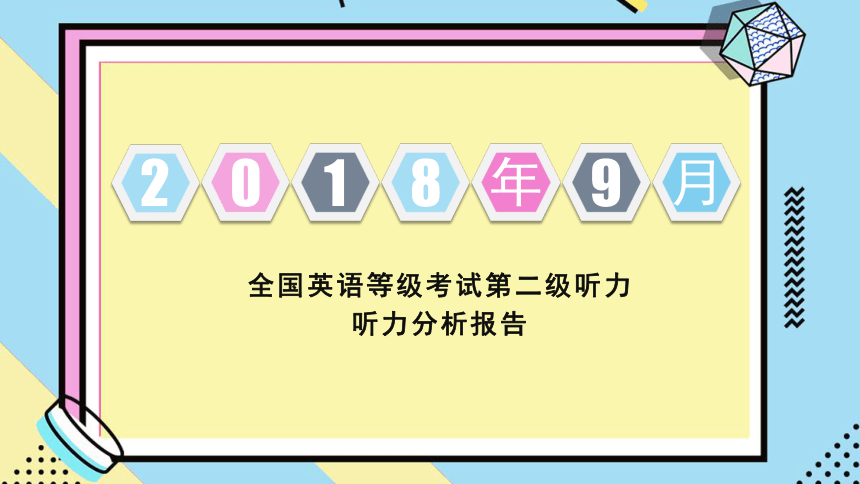 | |
| 格式 | pptx | ||
| 文件大小 | 11.8MB | ||
| 资源类型 | 教案 | ||
| 版本资源 | 通用版 | ||
| 科目 | 英语 | ||
| 更新时间 | 2022-10-13 11:35:29 | ||
图片预览

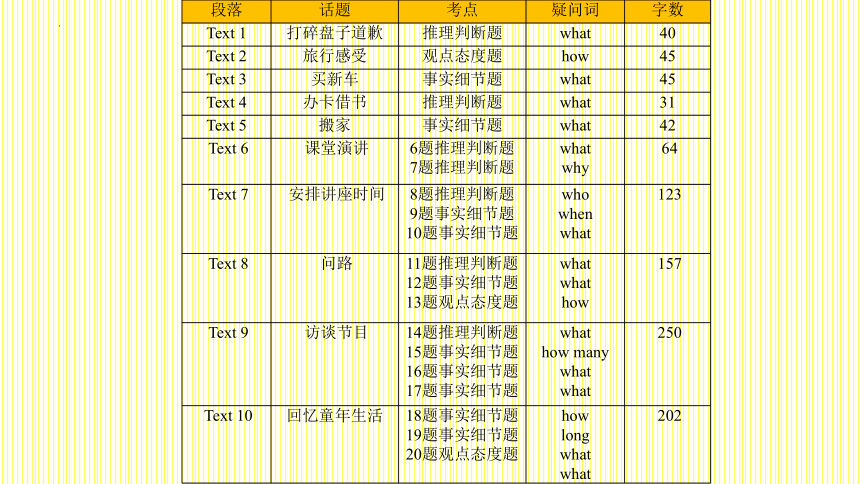
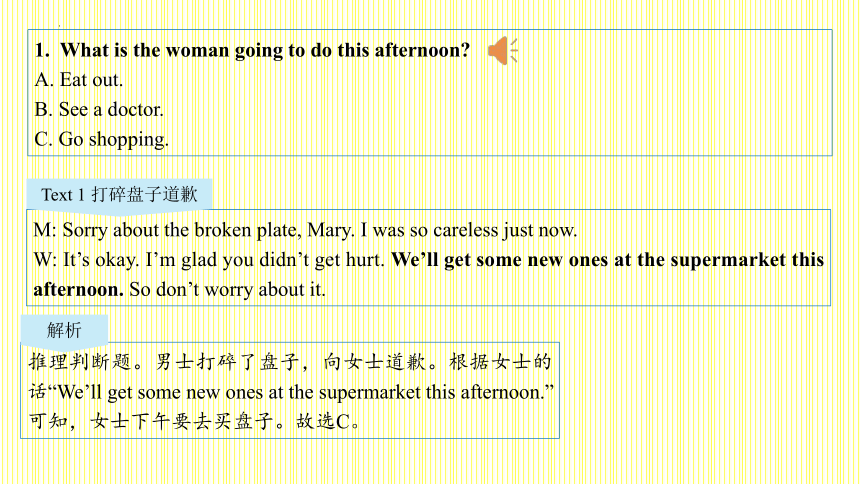
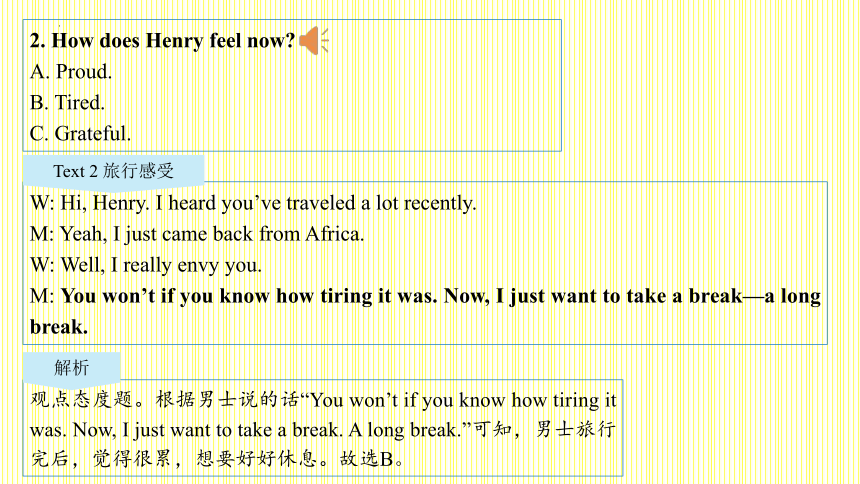
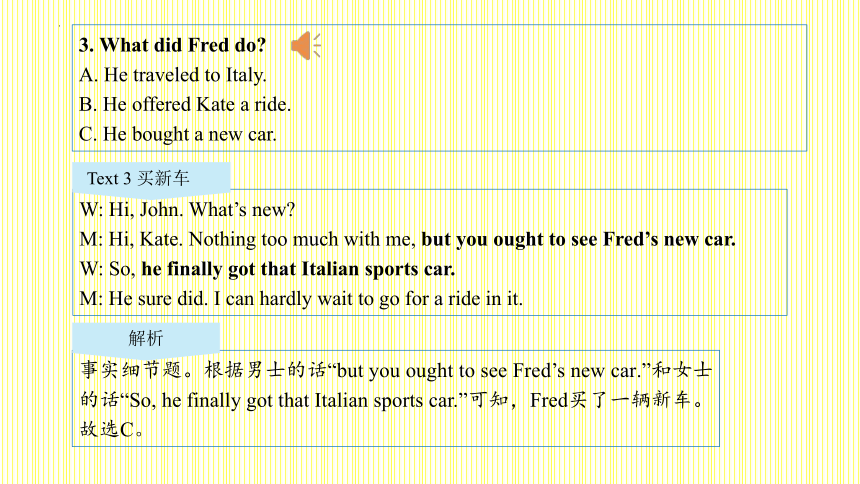
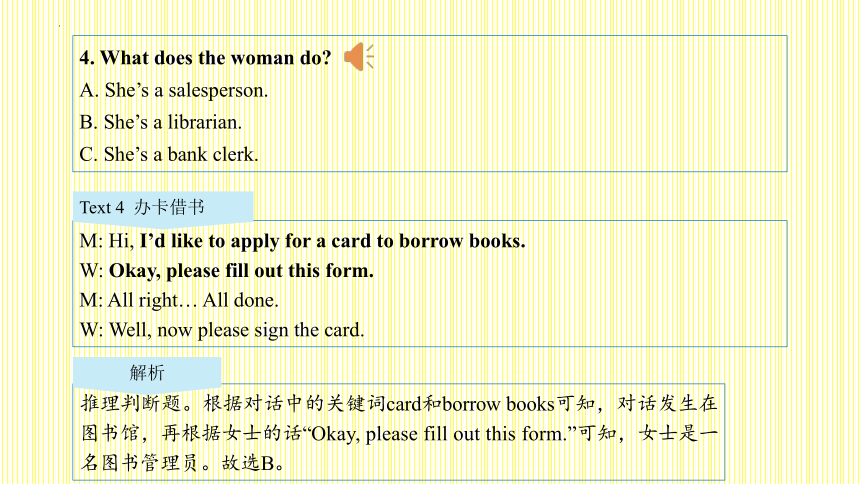
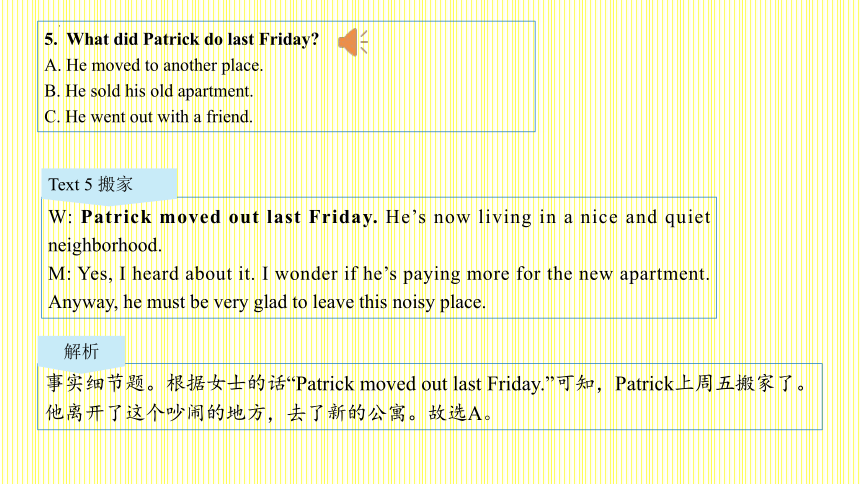
文档简介
全国英语等级考试第二级听力
听力分析报告
2
0
1
8
月
年
9
{5940675A-B579-460E-94D1-54222C63F5DA}段落
话题
考点
疑问词
字数
Text 1
打碎盘子道歉
推理判断题
what
40
Text 2
旅行感受
观点态度题
how
45
Text 3
买新车
事实细节题
what
45
Text 4
办卡借书
推理判断题
what
31
Text 5
搬家
事实细节题
what
42
Text 6
课堂演讲
6题推理判断题
7题推理判断题
what
why
64
Text 7
安排讲座时间
8题推理判断题
9题事实细节题10题事实细节题
who
when
what
123
Text 8
问路
11题推理判断题12题事实细节题13题观点态度题
what
what
how
157
Text 9
访谈节目
14题推理判断题15题事实细节题16题事实细节题17题事实细节题
what
how many
what
what
250
Text 10
回忆童年生活
18题事实细节题19题事实细节题20题观点态度题
how
long
what
what
202
推理判断题。男士打碎了盘子,向女士道歉。根据女士的话“We’ll get some new ones at the supermarket this afternoon.”可知,女士下午要去买盘子。故选C。
解析
1. What is the woman going to do this afternoon?
A. Eat out.
B. See a doctor.
C. Go shopping.
M: Sorry about the broken plate, Mary. I was so careless just now.
W: It’s okay. I’m glad you didn’t get hurt. We’ll get some new ones at the supermarket this afternoon. So don’t worry about it.
Text 1 打碎盘子道歉
观点态度题。根据男士说的话“You won’t if you know how tiring it was. Now, I just want to take a break. A long break.”可知,男士旅行完后,觉得很累,想要好好休息。故选B。
解析
2. How does Henry feel now?
A. Proud.
B. Tired.
C. Grateful.
W: Hi, Henry. I heard you’ve traveled a lot recently.
M: Yeah, I just came back from Africa.
W: Well, I really envy you.
M: You won’t if you know how tiring it was. Now, I just want to take a break—a long break.
Text 2 旅行感受
事实细节题。根据男士的话“but you ought to see Fred’s new car.”和女士的话“So, he finally got that Italian sports car.”可知,Fred买了一辆新车。故选C。
解析
W: Hi, John. What’s new?
M: Hi, Kate. Nothing too much with me, but you ought to see Fred’s new car.
W: So, he finally got that Italian sports car.
M: He sure did. I can hardly wait to go for a ride in it.
Text 3 买新车
3. What did Fred do?
A. He traveled to Italy.
B. He offered Kate a ride.
C. He bought a new car.
推理判断题。根据对话中的关键词card和borrow books可知,对话发生在图书馆,再根据女士的话“Okay, please fill out this form.”可知,女士是一名图书管理员。故选B。
解析
M: Hi, I’d like to apply for a card to borrow books.
W: Okay, please fill out this form.
M: All right… All done.
W: Well, now please sign the card.
Text 4 办卡借书
4. What does the woman do?
A. She’s a salesperson.
B. She’s a librarian.
C. She’s a bank clerk.
事实细节题。根据女士的话“Patrick moved out last Friday.”可知,Patrick上周五搬家了。他离开了这个吵闹的地方,去了新的公寓。故选A。
解析
W: Patrick moved out last Friday. He’s now living in a nice and quiet neighborhood.
M: Yes, I heard about it. I wonder if he’s paying more for the new apartment. Anyway, he must be very glad to leave this noisy place.
Text 5 搬家
5. What did Patrick do last Friday?
A. He moved to another place.
B. He sold his old apartment.
C. He went out with a friend.
6. 推理判断题。根据男士的话“Hi, Sara. How’s your speech for Professor Grey’s class next Monday?”可知,男士在询问女士下周一课上的演讲准备的怎么样了,故两人最可能是同学关系。故选B。
7. 推理判断题。根据女士的话“I just can’t see how to do it in a three-minute speech.”可知,她演讲的话题范围很广,她不知如何开展演讲。故选A。
解析
6. What is the probable relationship between the speakers?
A. Strangers.
B. Classmates.
C. Co-workers.
7. Why is Sara worried?
A. She has problem preparing for a speech.
B. She knows nothing about British history.
C. She fails to finish her homework on time.
M: (6)Hi, Sara. How’s your speech for Professor Grey’s class next Monday?
W: Actually, I’m a bit worried.
M: Why should you? What’s going on?
W: You know, what I chose to talk about is British history.
M: Really? That is a big topic.
W: Yes. There are so many things to cover. (7)I just can’t see how to do it in a three-minute speech.
Text 6 课堂演讲
8. 推理判断题。根据女士的话“I have a class on Tuesday afternoon, and probably Ms. Kelly can use my time.”和男士的话“and you should also talk to the students about the change.”可知,说话者在安排Ms. Kelly给学生做讲座的时间,说话者是老师。故选C。
9. 事实细节题。根据女士的话“I have a class on Tuesday afternoon, and probably Ms. Kelly can use my time.”和男士的回答“That’s possible. But I have to speak to Dr. Lee about that”可知,Ms. Kelly可能将用女士周二上课的时间做讲座。故选A。
10. 事实细节题。根据男士的话“But I have to speak to Dr. Lee about that”可知,他将去和Dr. Lee谈谈这个讲座时间。故选B。
解析
8. Who are the speakers?
A. Students.
B. Secretaries.
C. Teachers.
9. When will Ms.Kelly probably give the lecture?
A. On Tuesday.
B. On Wednesday.
C. On Friday.
10. What will the man probably do next?
A. Go on a trip.
B. Talk to Dr. Lee.
C. Start a research project.
M: Polly, Ms. Kelly has agreed to come and give a talk about international relations next week. When do you think we can fit her lecture in?
W: That’s great, Nick. What about Friday afternoon, then?
M: I’m afraid some students are planning to go on a trip. Maybe we can have it on Wednesday afternoon.
W: No, that’s not possible either. Most students are having group activities for their research projects. Well, I have an idea. (8)(9)I have a class on Tuesday afternoon, and probably Ms. Kelly can use my time.
M: That’s possible. (10)But I have to speak to Dr. Lee about that, (8)and you should also talk to the students about the change.
W: Oh, yes. I’ll certainly do that.
Text 7 安排讲座时间
11. 推理判断题。根据男士的话“Excuse me, I’m trying to get to the Spring Gardens. Is it far from here?”可知,男士想去Spring Gardens,在向女士询问那里远不远。故选A。
12. 事实细节题。女士指的路比较复杂,根据男士的话“I think I’ll get a taxi.”可知,他将会打车去目的地。故选B。
13. 观点态度题。男士一开始走错了路,女士告诉男士怎么去Spring Gardens,但是她指的路很复杂,男士决定打车过去,天气开始下雨了,再根据男士的话“I’m getting wet. What a day!”可知,他身上都湿透了,语气听起来很不高兴。故选A。
解析
11. What is the man doing?
A. Asking for directions.
B. Touring the city center.
C. Talking to a friend.
12. What does the man decide to do?
A. Keep walking.
B. Get a taxi.
C. Wait for the bus.
13. How does the man feel at the end of the conversation?
A. Annoyed.
B. Excited.
C. Surprised.
M: Excuse me, (11)I’m trying to get to the Spring Gardens. Is it far from here?
W: Spring Gardens? No, it’s not this way. It’s in the city center.
M: (11)Is it? Oh, no! Someone told me it was this way.
W: No, no. It’s not this way. You want to go down there.
M: Yes, okay, down there.
W: Yep. Then, turn left, okay?
M: Left…
W: Yep, then right—first street on your right.
M: Right.
W: Then straight on, keep walking…
M: Oh, I’m lost! It sounds really difficult. Um, could I get a taxi anywhere near here?
W: It’s not so far. You just walk to the corner of the street or over the next block. There are buses that can take you there.
M: Well, it’s starting to rain. (12)I think I’ll get a taxi. Thanks, anyway.
W: That’s okay. Lots of taxis go this way.
M: (13)I’m getting wet. What a day!
Text 8 问路
14. 推理判断题。根据“Hello, welcome to this week’s ‘People You Meet’. Today, we present to you Mark Leach, an information officer in London.”可知,“People You Meet”最可能是一档广播节目。故选C。
15. 事实细节题。根据男士的话“And each year, we have about 500,000 people come to the office.”可知,他的办公室每年会接待50万人。故选C。
解析
14. What is “People You Meet”?
A. An office party.
B. A training course.
C. A radio program.
15. How many people does Mark’s office receive every year?
A. 100,000.
B. 200,000.
C. 500,000.
16.事实细节题。根据男士的话“I’m in charge of an information team.”可知,他负责信息团队,是团队的领导。故选A。
17. 事实细节题。根据男士的话“And we can offer suggestions of where to go and how to get there. If people want a two-week tour of Britain, we can plan out exactly where to visit, what roads to take.”可知,他和同事们可以帮人们计划旅行。故选B。
解析
16. What do we know about Mark?
A. He is a team leader.
B. He was born in London.
C. He speaks thirteen languages.
17. What do Mark and his co-workers usually do to help people?
A. Show them around.
B. Plan tours for them.
C. Teach them English.
W: Hello, (14)welcome to this week’s “People You Meet”. Today, we present to you Mark Leach, an information officer in London.
M: Hi, everyone. My name’s Mark Leach. I’m an information officer at the Britain Business Center, which is a tourist office for the British Tourist Board in London. Here, we offer a tourist information service to mainly visitors from overseas. (15)And each year, we have about 500, 000 people come to the office.
W: Wow, that’s a large number of people. How do you manage to meet the needs of so many people?
M: (16)I’m in charge of an information team. The team has about ten officers who give tourist information directly over the counter to visitors. We speak a total of thirteen languages altogether.
W: That’s pretty cool! So, what exactly do you do every day?
M: Well, we act as a one-stop shop for anyone who wants to come in. So, it could be that they want a day-trip from London, which is a very popular request. (17)And we can offer suggestions of where to go and how to get there. If people want a two-week tour of Britain, we can plan out exactly where to visit, what roads to take.
W: So, do you have any suggestions for people coming to Britain?
M: A good suggestion is to see as much as you can, but try to come back again and again to see different parts of the country. Because in that way, you’ll really experience it.
Text 9 访谈节目
18. 事实细节题。根据独白中的“For eight years, we lived downtown in a large 10-story building with no less than 30 apartments in it.” 可知,说话者和他的家人在市中心的公寓住了8年。故选A。
19. 事实细节题。根据独白中的“No sun, no open air, no football games.”和“No outdoor activities because the streets were too dangerous”可知,不能去外面玩耍是说话者童年不快乐的原因。故选B。
20. 观点态度题。根据“How I wished for the weekends to come. I could then burst out with joy and happiness when we went out for a visit to some friends or relatives, a picnic, or even a car ride.”可知,户外运动让说话者非常快乐。故选C。
解析
18. How long did the speaker and his family live in the downtown apartment?
A. 8 years.
B. 10 years.
C. 30 years.
19. What was the reason for the speaker’s unpleasant childhood?
A. Strict family rules.
B. Little chance to play outside.
C. Too much school work.
20. What does the speaker think of outdoor activities?
A. Colorless.
B. Dangerous.
C. Enjoyable.
M: Right! Next, I’ll tell you something about my childhood. Although we have always lived in the same city, my family and I moved a lot since I was old enough to remember. We don’t have our own house. We have always rented them. (18)For eight years, we lived downtown in a large 10-story building with no less than 30 apartments in it. The conditions were very good. But on the other hand, we had a lot of problems. (19)Imagine how difficult and colorless life was for a nine-year-old boy, full of life, having no place to play freely. No sun, no open air, no football games. School’s from 7:30 to noon and the afternoon’s spent in a room studying, reading, or playing indoor games with a friend or two. No outdoor activities because the streets were too dangerous, and the parents much too afraid to let a young boy go out. (20)How I wished for the weekends to come! I could then burst out with joy and happiness when we went out for a visit to some friends or relatives, a picnic, or even a car ride. I think that’s one of the reasons why I became such a strong nature lover.
Text 10 回忆童年生活
听力分析报告
2
0
1
8
月
年
9
{5940675A-B579-460E-94D1-54222C63F5DA}段落
话题
考点
疑问词
字数
Text 1
打碎盘子道歉
推理判断题
what
40
Text 2
旅行感受
观点态度题
how
45
Text 3
买新车
事实细节题
what
45
Text 4
办卡借书
推理判断题
what
31
Text 5
搬家
事实细节题
what
42
Text 6
课堂演讲
6题推理判断题
7题推理判断题
what
why
64
Text 7
安排讲座时间
8题推理判断题
9题事实细节题10题事实细节题
who
when
what
123
Text 8
问路
11题推理判断题12题事实细节题13题观点态度题
what
what
how
157
Text 9
访谈节目
14题推理判断题15题事实细节题16题事实细节题17题事实细节题
what
how many
what
what
250
Text 10
回忆童年生活
18题事实细节题19题事实细节题20题观点态度题
how
long
what
what
202
推理判断题。男士打碎了盘子,向女士道歉。根据女士的话“We’ll get some new ones at the supermarket this afternoon.”可知,女士下午要去买盘子。故选C。
解析
1. What is the woman going to do this afternoon?
A. Eat out.
B. See a doctor.
C. Go shopping.
M: Sorry about the broken plate, Mary. I was so careless just now.
W: It’s okay. I’m glad you didn’t get hurt. We’ll get some new ones at the supermarket this afternoon. So don’t worry about it.
Text 1 打碎盘子道歉
观点态度题。根据男士说的话“You won’t if you know how tiring it was. Now, I just want to take a break. A long break.”可知,男士旅行完后,觉得很累,想要好好休息。故选B。
解析
2. How does Henry feel now?
A. Proud.
B. Tired.
C. Grateful.
W: Hi, Henry. I heard you’ve traveled a lot recently.
M: Yeah, I just came back from Africa.
W: Well, I really envy you.
M: You won’t if you know how tiring it was. Now, I just want to take a break—a long break.
Text 2 旅行感受
事实细节题。根据男士的话“but you ought to see Fred’s new car.”和女士的话“So, he finally got that Italian sports car.”可知,Fred买了一辆新车。故选C。
解析
W: Hi, John. What’s new?
M: Hi, Kate. Nothing too much with me, but you ought to see Fred’s new car.
W: So, he finally got that Italian sports car.
M: He sure did. I can hardly wait to go for a ride in it.
Text 3 买新车
3. What did Fred do?
A. He traveled to Italy.
B. He offered Kate a ride.
C. He bought a new car.
推理判断题。根据对话中的关键词card和borrow books可知,对话发生在图书馆,再根据女士的话“Okay, please fill out this form.”可知,女士是一名图书管理员。故选B。
解析
M: Hi, I’d like to apply for a card to borrow books.
W: Okay, please fill out this form.
M: All right… All done.
W: Well, now please sign the card.
Text 4 办卡借书
4. What does the woman do?
A. She’s a salesperson.
B. She’s a librarian.
C. She’s a bank clerk.
事实细节题。根据女士的话“Patrick moved out last Friday.”可知,Patrick上周五搬家了。他离开了这个吵闹的地方,去了新的公寓。故选A。
解析
W: Patrick moved out last Friday. He’s now living in a nice and quiet neighborhood.
M: Yes, I heard about it. I wonder if he’s paying more for the new apartment. Anyway, he must be very glad to leave this noisy place.
Text 5 搬家
5. What did Patrick do last Friday?
A. He moved to another place.
B. He sold his old apartment.
C. He went out with a friend.
6. 推理判断题。根据男士的话“Hi, Sara. How’s your speech for Professor Grey’s class next Monday?”可知,男士在询问女士下周一课上的演讲准备的怎么样了,故两人最可能是同学关系。故选B。
7. 推理判断题。根据女士的话“I just can’t see how to do it in a three-minute speech.”可知,她演讲的话题范围很广,她不知如何开展演讲。故选A。
解析
6. What is the probable relationship between the speakers?
A. Strangers.
B. Classmates.
C. Co-workers.
7. Why is Sara worried?
A. She has problem preparing for a speech.
B. She knows nothing about British history.
C. She fails to finish her homework on time.
M: (6)Hi, Sara. How’s your speech for Professor Grey’s class next Monday?
W: Actually, I’m a bit worried.
M: Why should you? What’s going on?
W: You know, what I chose to talk about is British history.
M: Really? That is a big topic.
W: Yes. There are so many things to cover. (7)I just can’t see how to do it in a three-minute speech.
Text 6 课堂演讲
8. 推理判断题。根据女士的话“I have a class on Tuesday afternoon, and probably Ms. Kelly can use my time.”和男士的话“and you should also talk to the students about the change.”可知,说话者在安排Ms. Kelly给学生做讲座的时间,说话者是老师。故选C。
9. 事实细节题。根据女士的话“I have a class on Tuesday afternoon, and probably Ms. Kelly can use my time.”和男士的回答“That’s possible. But I have to speak to Dr. Lee about that”可知,Ms. Kelly可能将用女士周二上课的时间做讲座。故选A。
10. 事实细节题。根据男士的话“But I have to speak to Dr. Lee about that”可知,他将去和Dr. Lee谈谈这个讲座时间。故选B。
解析
8. Who are the speakers?
A. Students.
B. Secretaries.
C. Teachers.
9. When will Ms.Kelly probably give the lecture?
A. On Tuesday.
B. On Wednesday.
C. On Friday.
10. What will the man probably do next?
A. Go on a trip.
B. Talk to Dr. Lee.
C. Start a research project.
M: Polly, Ms. Kelly has agreed to come and give a talk about international relations next week. When do you think we can fit her lecture in?
W: That’s great, Nick. What about Friday afternoon, then?
M: I’m afraid some students are planning to go on a trip. Maybe we can have it on Wednesday afternoon.
W: No, that’s not possible either. Most students are having group activities for their research projects. Well, I have an idea. (8)(9)I have a class on Tuesday afternoon, and probably Ms. Kelly can use my time.
M: That’s possible. (10)But I have to speak to Dr. Lee about that, (8)and you should also talk to the students about the change.
W: Oh, yes. I’ll certainly do that.
Text 7 安排讲座时间
11. 推理判断题。根据男士的话“Excuse me, I’m trying to get to the Spring Gardens. Is it far from here?”可知,男士想去Spring Gardens,在向女士询问那里远不远。故选A。
12. 事实细节题。女士指的路比较复杂,根据男士的话“I think I’ll get a taxi.”可知,他将会打车去目的地。故选B。
13. 观点态度题。男士一开始走错了路,女士告诉男士怎么去Spring Gardens,但是她指的路很复杂,男士决定打车过去,天气开始下雨了,再根据男士的话“I’m getting wet. What a day!”可知,他身上都湿透了,语气听起来很不高兴。故选A。
解析
11. What is the man doing?
A. Asking for directions.
B. Touring the city center.
C. Talking to a friend.
12. What does the man decide to do?
A. Keep walking.
B. Get a taxi.
C. Wait for the bus.
13. How does the man feel at the end of the conversation?
A. Annoyed.
B. Excited.
C. Surprised.
M: Excuse me, (11)I’m trying to get to the Spring Gardens. Is it far from here?
W: Spring Gardens? No, it’s not this way. It’s in the city center.
M: (11)Is it? Oh, no! Someone told me it was this way.
W: No, no. It’s not this way. You want to go down there.
M: Yes, okay, down there.
W: Yep. Then, turn left, okay?
M: Left…
W: Yep, then right—first street on your right.
M: Right.
W: Then straight on, keep walking…
M: Oh, I’m lost! It sounds really difficult. Um, could I get a taxi anywhere near here?
W: It’s not so far. You just walk to the corner of the street or over the next block. There are buses that can take you there.
M: Well, it’s starting to rain. (12)I think I’ll get a taxi. Thanks, anyway.
W: That’s okay. Lots of taxis go this way.
M: (13)I’m getting wet. What a day!
Text 8 问路
14. 推理判断题。根据“Hello, welcome to this week’s ‘People You Meet’. Today, we present to you Mark Leach, an information officer in London.”可知,“People You Meet”最可能是一档广播节目。故选C。
15. 事实细节题。根据男士的话“And each year, we have about 500,000 people come to the office.”可知,他的办公室每年会接待50万人。故选C。
解析
14. What is “People You Meet”?
A. An office party.
B. A training course.
C. A radio program.
15. How many people does Mark’s office receive every year?
A. 100,000.
B. 200,000.
C. 500,000.
16.事实细节题。根据男士的话“I’m in charge of an information team.”可知,他负责信息团队,是团队的领导。故选A。
17. 事实细节题。根据男士的话“And we can offer suggestions of where to go and how to get there. If people want a two-week tour of Britain, we can plan out exactly where to visit, what roads to take.”可知,他和同事们可以帮人们计划旅行。故选B。
解析
16. What do we know about Mark?
A. He is a team leader.
B. He was born in London.
C. He speaks thirteen languages.
17. What do Mark and his co-workers usually do to help people?
A. Show them around.
B. Plan tours for them.
C. Teach them English.
W: Hello, (14)welcome to this week’s “People You Meet”. Today, we present to you Mark Leach, an information officer in London.
M: Hi, everyone. My name’s Mark Leach. I’m an information officer at the Britain Business Center, which is a tourist office for the British Tourist Board in London. Here, we offer a tourist information service to mainly visitors from overseas. (15)And each year, we have about 500, 000 people come to the office.
W: Wow, that’s a large number of people. How do you manage to meet the needs of so many people?
M: (16)I’m in charge of an information team. The team has about ten officers who give tourist information directly over the counter to visitors. We speak a total of thirteen languages altogether.
W: That’s pretty cool! So, what exactly do you do every day?
M: Well, we act as a one-stop shop for anyone who wants to come in. So, it could be that they want a day-trip from London, which is a very popular request. (17)And we can offer suggestions of where to go and how to get there. If people want a two-week tour of Britain, we can plan out exactly where to visit, what roads to take.
W: So, do you have any suggestions for people coming to Britain?
M: A good suggestion is to see as much as you can, but try to come back again and again to see different parts of the country. Because in that way, you’ll really experience it.
Text 9 访谈节目
18. 事实细节题。根据独白中的“For eight years, we lived downtown in a large 10-story building with no less than 30 apartments in it.” 可知,说话者和他的家人在市中心的公寓住了8年。故选A。
19. 事实细节题。根据独白中的“No sun, no open air, no football games.”和“No outdoor activities because the streets were too dangerous”可知,不能去外面玩耍是说话者童年不快乐的原因。故选B。
20. 观点态度题。根据“How I wished for the weekends to come. I could then burst out with joy and happiness when we went out for a visit to some friends or relatives, a picnic, or even a car ride.”可知,户外运动让说话者非常快乐。故选C。
解析
18. How long did the speaker and his family live in the downtown apartment?
A. 8 years.
B. 10 years.
C. 30 years.
19. What was the reason for the speaker’s unpleasant childhood?
A. Strict family rules.
B. Little chance to play outside.
C. Too much school work.
20. What does the speaker think of outdoor activities?
A. Colorless.
B. Dangerous.
C. Enjoyable.
M: Right! Next, I’ll tell you something about my childhood. Although we have always lived in the same city, my family and I moved a lot since I was old enough to remember. We don’t have our own house. We have always rented them. (18)For eight years, we lived downtown in a large 10-story building with no less than 30 apartments in it. The conditions were very good. But on the other hand, we had a lot of problems. (19)Imagine how difficult and colorless life was for a nine-year-old boy, full of life, having no place to play freely. No sun, no open air, no football games. School’s from 7:30 to noon and the afternoon’s spent in a room studying, reading, or playing indoor games with a friend or two. No outdoor activities because the streets were too dangerous, and the parents much too afraid to let a young boy go out. (20)How I wished for the weekends to come! I could then burst out with joy and happiness when we went out for a visit to some friends or relatives, a picnic, or even a car ride. I think that’s one of the reasons why I became such a strong nature lover.
Text 10 回忆童年生活
